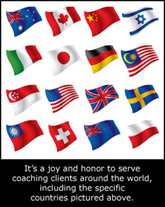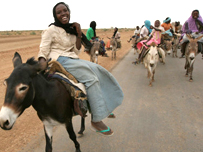 Country profile: Sudan
Country profile: Sudan

In Sudan, decades of ongoing conflict and brutal civil war, debilitating droughts, and reliance on subsistence farming have impoverished the majority of those who have managed to survive. Shifting refugee populations have experienced a persistence of malaria, dysentery, and tuberculosis resulting from malnutrition, particularly in the rural areas of Southern Sudan. Among the relatively stable—for now—peri-urban and urban populations, AIDS has steadily increased. A scarcity of trained health care professionals and the absence of adequate facilities have left Southern Sudan with the highest rate of maternal mortality in the world.
Sudan is the largest and one of the most diverse countries in Africa, home to deserts, mountain ranges, swamps and rain forests. It emerged from a two-decade civil war between the mainly Muslim north and the Animist and Christian south, only to see fighting break out in the western region of Darfur in early 2003. 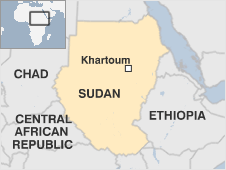
The north-south civil war is said to have cost the lives of 1.5 million people. In Darfur, the UN says more than two million people have fled their homes and more than 200,000 have been killed.
Overview
Southern rebels said they were battling oppression and marginalisation. After two years of bargaining, they signed a comprehensive peace deal with the government to end the civil war in January 2005.
 |
AT-A-GLANCE
Humanitarian crisis: Civil war in Darfur region is seen as "one of the worst nightmares in recent history"
Politics: Omar al-Bashir heads a unity government formed after a peace deal ended 20 years of southern civil war. An independence referendum in the south will follow a six-year period of autonomy
Economy: Oil production and revenues are rising
|
The accord provides for a high degree of autonomy for the south. The region will also share oil revenue equally with the north.
But in Darfur, pro-government Arab militias are accused of carrying out a campaign of ethnic cleansing against non-Arab groups in the region.
The conflict has strained relations between Sudan and Chad, to the west. Both countries have accused each other of cross-border incursions. There have been fears that the Darfur conflict could lead to a wider, regional war.
Decades of fighting have left Sudan's infrastructure in tatters. With the return of millions of displaced southerners, there is a pressing need for reconstruction.
The economic dividends of peace could be great. Sudan has large areas of cultivatable land, as well as gold and cotton. Its oil reserves are ripe for further exploitation.
Sudan's name comes from the Arabic "bilad al-sudan", or land of the blacks. Arabic is the official language and Islam is the religion of the state, but the country has a large non-Arabic speaking and non-Muslim population which has rejected attempts by the government in Khartoum to impose Islamic Sharia law on the country as a whole.
President Omar al-Bashir has been locked in a power struggle with Hassan al-Turabi, his former mentor and the main ideologue of Sudan's Islamist government. Since 2001 Mr Turabi has spent periods in detention and has been accused, but not tried, over an alleged coup plot.
Facts
- Full name: Republic of Sudan
- Population: 42.2 million (UN, 2009)
- Capital: Khartoum
- Area: 2.5 million sq km (966,757 sq miles)
- Major languages: Arabic; Nubian, others
- Major religions: Islam, Christianity
- Life expectancy: 56 years (men), 60 years (women) (UN)
- Monetary unit: Sudanese dinar
- Main exports: Oil, cotton, sesame, livestock and hides, gum arabic
- GNI per capita: US $1,130 (World Bank, 2008)
- Internet domain: .sd
- International dialling code: +249
Leaders
President: Omar Hassan Ahmad al-Bashir
The International Criminal Court in The Hague on 4 March 2009 issued an arrest warrant for President Omar al-Bashir on charges of war crimes and crimes against humanity in Darfur.
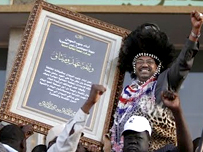
Photo: President Omar Al Bashir Wearing South Sudanese Traditional Costume
|
Mr Bashir is the first sitting head of state for which the court has issued a warrant since it started its work in 2002.
He has dismissed the court's allegations and has continued to travel to countries which oppose the indictment.
Omar al-Bashir formed a government of national unity in July 2005 as part of a deal to end the conflict in southern Sudan, Africa's longest-running civil war.
Under the Comprehensive Peace Agreement signed in Nairobi, the south was granted limited autonomy and a referendum on full independence by 2019.
However, as the civil war between north and south was coming to an end, another one broke out in the western region of Darfur. Following rebel attacks, President Bashir's regime was accused of orchestrating violence by pro-government militias in which hundreds of thousands are thought to have been killed.
Alliance
Omar al-Bashir took power in a June 1989 military coup against the elected government of Prime Minister Sadiq al-Mahdi.
Born in 1944 into a farming family, he joined the army as a young man and rose through the ranks. He fought in the Egyptian army in the 1973 war with Israel and led the military campaign against southern rebels.
On taking power, Mr Bashir dissolved parliament, banned political parties and set up and chaired the Revolutionary Command Council for National Salvation, which ruled through a civilian government.
He formed an alliance with Hassan al-Turabi, the leader of the National lslamic Front, who became the regime's ideologue and is thought to be behind the introduction of Sharia law in the north in 1991. In 1993 Mr Bashir dissolved the Revolutionary Command for National Salvation, concentrating power in his own hands.
Mr Bashir was elected president in 1996, and Hassan al-Turabi became speaker of parliament. A new constitution was drawn up and some opposition activity was permitted.
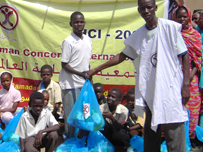
The distribution of hundreds of much needed “goodwill” or “fasting” food packages as they are called in Sudan were implemented all over the capital as well.
|
But in late 1999 Mr Bashir dissolved parliament and declared a state of emergency after Mr Turabi tried to give parliament the power to remove the president and to reinstate the post of prime minister. Hassan al-Turabi was later imprisoned, accused of treason after signing a deal with separatist rebels in the south.
President Bashir won re-election in 2000. Supporters of the National Congress Party filled the parliament. The opposition boycotted the poll, accusing Mr Bashir of vote-rigging.
First vice president: Salva Kiir
Vice president: Ali Osman Taha
Media
Sudanese broadcasting is highly restricted. State-run radio and TV reflect government policy. A military censor ensures that the news reflects official views.
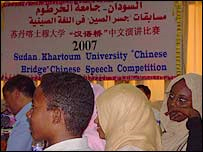
The private press enjoys more freedom than state broadcasters
|
There are no privately-owned TV stations apart from a cable service jointly owned by the government and private investors.
Satellite dishes are a common sight in affluent areas and pan-Arab stations are popular among viewers.
State-run national radio networks broadcast news, music and cultural programmes. International broadcasters are also heard, including the BBC which is relayed on FM in Khartoum and other parts of the north, and in Juba in the south. Several opposition and clandestine stations broadcast to Sudan.
The private press enjoys a greater degree of freedom than the state broadcasters and offers a limited forum for opposition views, but the state retains and uses powers to influence what is published.
In the semi-autonomous south, the lack of infrastructure limits media operations. However, broadcasters and newspapers, some with foreign funding, are active. Radio is the most-popular medium. The region's president has said he wants to "create space for the media to enjoy freedom".
The press
- Al-Ra'y al-Amm (The Public Opinion) - private, mass-circulation daily
- Al-Ayam (The Days) - established daily
- Khartoum Monitor - privately-owned, English-language
- Al-Khartoum - privately-owned
- Alwan - Khartoum daily
- Al-Sahafah (The Press) - daily
- Al-Anba - government-owned
- The Juba Post - private weekly in the south
Television
Radio
- Sudan National Radio Corporation - government-run, national and regional networks in Arabic, English and other languages
- Mango 96 FM - private, music-based Khartoum station
- Miraya (Mirror) FM - operated by UN mission, broadcasts from southern capital of Juba
- Radio Juba - government-owned radio in the south
- Liberty FM - in Juba and Yei
Opposition and clandestine radios
- Voice of Sudan - operated by opposition National Democratic Alliance (NDA), broadcasts on shortwave
- Voice of Freedom and Renewal - operated by armed opposition group Sudan Alliance Forces, via shortwave
News agency/internet
AFRICA | ASIA-PACIFIC | AMERICAS | EUROPE | MIDDLEEAST | SOUTHASIA



Mauritania Mauritius Morocco Mozambique Namibia Niger Nigeria Republic-of-congo Rwanda Sao-tome-and-principe Senegal Seychelles Sierra-leone Somalia South-africa Sudan Swaziland Tanzania The-gambia Togo Tunisia Uganda Australia Brunei Burma Cambodia China East-timor Fiji Indonesia Japan Kazakhstan Kiribati Kyrgyzstan Laos Malaysia Marshall-islands Micronesia Mongolia Nauru New-zealand North-korea Palau Papua-new-guinea Samoa Singapore Solomon-islands South-korea Taiwan Tajikistan Thailand The-philippines Tonga Turkmenistan Tuvalu Uzbekistan Vanuatu Vietnam Antigua-and-barbuda Belize Bolivia Brazil Canada Chile Colombia Costa-rica Cuba Dominica Dominican-republic Ecuador El-salvador Grenada Guatemala Guyana Haiti Honduras Jamaica Mexico Nicaragua St-kitts-and-nevis St-lucia Suriname Trinidad-and-tobago Uruguay Venezuela Albania Andorra Armenia Austria Azerbaijan Belarus Belgium Bosnia-hercegovina Bulgaria Croatia Cyprus Czech-republic Denmark Estonia Finland France Georgia Germany Greece Hungary Iceland Ireland Italy Latvia Liechtenstein Lithuania Luxembourg Macedonia Malta Moldova Monaco Montenegro Norway Poland Portugal Russia San-marino Serbia Slovakia Slovenia Spain Sweden Algeria Egypt Iran Iraq Israel-and-palestinian-territories Jordan Kuwait Lebanon Libya Mauritania Oman Saudi-arabia Sudan Syria Tunisia United-arab-emirates Yemen Afghanistan Bangladesh Bhutan India Nepal Pakistan Sri-Lanka The-Maldive


